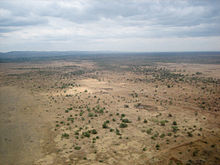
Both grand and petty corruption are serious problems in Tanzania yet various comprehensive laws are in place to prevent corruption. It is largely due to a weak internal control and low or non-compliance with anti-corruption regulations within different government agencies. For instance, public procurement, taxation, and customs service are areas that are prone to corruption.
On Transparency International's 2023 Corruption Perceptions Index, Tanzania scored 40 on a scale from 0 ("highly corrupt") to 100 ("very clean"). When ranked by score, Tanzania ranked 87th among the 180 countries in the Index, where the country ranked first is perceived to have the most honest public sector. For comparison with worldwide scores, the best score was 90 (ranked 1), the average score was 43, and the worst score was 11 (ranked 180). For comparison with regional scores, the average score among sub-Saharan African countries was 33. The highest score in sub-Saharan Africa was 71 and the lowest score was 11.
Foreign companies have identified that corruption within those sectors poses potential obstacles for doing business in Tanzania as bribes are often demanded. It is also believed that the existing large informal sector, 48.1% of GDP, is associated with cumbersome business registration process which has created opportunities for corruption.
President John Magufuli launched a campaign against grand corruption and established a special court to handle the matter. As a result, corrupt officials were fired. These efforts and similar projects are internationally supported by Germany and the European Union. Before his death in office in March 2021, there were fears that such anti-corruption efforts would end when President Magufuli stepped down.
Notes
- Angola, Benin, Botswana, Burkina Faso, Burundi, Cameroon, Cape Verde, Central African Republic, Chad, Comoros, Democratic Republic of the Congo, Djibouti, Equatorial Guinea, Eritrea, Ethiopia, Gabon, Gambia, Ghana, Guinea, Guinea-Bissau, Kenya, Lesotho, Republic of the Congo, Swaziland, Liberia, Madagascar, Malawi, Mali, Mauritania, Namibia, Niger, Nigeria, Rwanda, Sao Tome and Principe, Senegal, Seychelles, Sierra Leone, Somalia, South Sudan, Sudan, Tanzania, Togo, Uganda, Zambia, and Zimbabwe.
References
- Corruption in Tanzania. Cambria Press. ISBN 978-1-62196-800-9.
- "The ABCs of the CPI: How the Corruption Perceptions Index is calculated". Transparency.org. Retrieved 11 March 2024.
- "Corruption Perceptions Index 2023: Tanzania". Transparency.org. Retrieved 11 March 2024.
- "CPI 2023 for Sub-Saharan Africa: Impunity for Corrupt Officials, Restricted Civic Space & Limited Access to Justice". Transparency.org. Retrieved 11 March 2024.
- "Tanzania Corruption Profile". Business Anti-Corruption Portal. Archived from the original on 12 August 2016. Retrieved 14 July 2015.
- "Size and contribution of the informal sector". IPP Media. Retrieved 6 February 2014.
- Kilimwiko, Lawrence. "Civic competence contains corruption". D+C, development and cooperation.
External links
- Tanzania Corruption Profile from the Business Anti-Corruption Portal
| Corruption in Africa | |
|---|---|
| Sovereign states |
|
| States with limited recognition | |
| Dependencies and other territories |
|
| Tanzania articles | |||
|---|---|---|---|
| History |  | ||
| Geography | |||
| Politics | |||
| Economy | |||
| Society | |||
| Zanzibar | |||
This article related to government in Tanzania is a stub. You can help Misplaced Pages by expanding it. |
